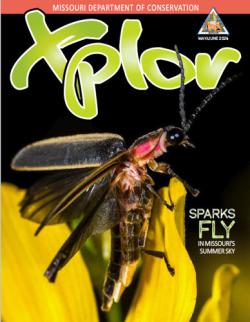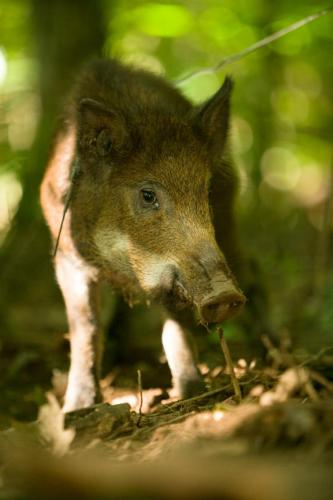
Xplor reconnects kids to nature and helps them find adventure in their own backyard. Free to residents of Missouri.


































Stay in Touch with MDC news, newsletters, events, and manage your subscription

Xplor reconnects kids to nature and helps them find adventure in their own backyard. Free to residents of Missouri.

A monthly publication about conservation in Missouri. Started in 1938, the printed magazine is free to residents of Missouri.


JEFFERSON CITY, Mo. – Missouri took another step forward this month in the fight to eliminate invasive feral hogs in the state when the U.S. Forest Service (USFS) moved forward with prohibiting the hunting of feral hogs on public land in the Mark Twain National Forest (MTNF). With the USFS’s closure of feral hog hunting in MTNF, they also announced the allowance of opportunistic take of feral hogs in the MTNF during all deer and turkey hunting seasons. Only those hunters with an unfilled permit in compliance with the permit conditions may take hogs. Most public land agencies had already closed feral hog hunting in 2016 after 25 years of allowing hog hunting while trapping only increased the range of feral hogs in Missouri.
“We received and reviewed more than a thousand comments from our public outreach around this decision,” stated Tony Crump, Deputy Forest Supervisor for Mark Twain National Forest. “By allowing for opportunistic take during all deer and turkey hunting seasons, we incorporated public feedback to most effectively remove these invasive pigs from Missouri in alignment with the Missouri Feral Hog Elimination Partnership.”
With the MTNF announcement, the Conservation Commission has directed the Missouri Department of Conservation (MDC) to propose regulation changes identical to the USFS regulation. This will ensure consistency of feral hog regulations on USFS and MDC managed lands by allowing for the opportunistic take of feral hogs during all deer and turkey hunting seasons. While the USFS announcement is effective immediately on the Mark Twain National Forest and will apply to the rest of the of the 2019-2020 deer season, the change will not be in place for the 2019-2020 alternative methods and archery hunting season on MDC lands. The MDC proposal will need to make its way through the State’s regulatory process, which includes a formal public comment period on the rulemakings. The prohibition of hunting on public lands does NOT apply to private lands where landowners may hunt/shoot feral hogs on their lands.
Opportunistic take refers to takings that result from, but are not the purpose of, carrying out an otherwise lawful activity. In this case, it allows for a person possessing an unfilled deer or turkey hunting permit to opportunistically take feral hogs while in pursuit of deer or turkey during the hunting season.
“The closure of the Mark Twain National Forest to feral hog hunting is a positive move toward the elimination of this destructive pest from our state,” said MDC Director Sara Parker Pauley. “We have already seen significant progress on public land around Truman and Stockton Reservoirs where the no hunting regulation has been in place since 2016.”
Feral hogs became established in southern Missouri when some individuals released them for hunting. Between natural reproduction and continued illegal releases, the feral hog population exploded in southern Missouri. They now occur in more than 30 Missouri counties. Recreational hunting of feral hogs complicates efforts to trap and eliminate them. Hunting activities, particularly hunting with dogs, scatters the sounder and makes trapping efforts aimed at catching the entire group very difficult, because hogs become trap-shy and wary of baited sites. This pattern has been repeated in several states where the combination of recreational hunting and trapping programs has resulted in a larger feral hog population. Examples from other states and from large areas of private land in Missouri show that allowing state and federal wildlife managers to eliminate feral hogs yields the best results.
A group of ten hogs can destroy 10 to 20 acres overnight, including crops, causing financial burdens on Missouri's landowners and agricultural producers.
“We continue to hear from Missouri farmers and ranchers who have damage to their farmland and are concerned about the animal disease threat feral swine pose,” said Missouri Director of Agriculture Chris Chinn. “Agriculture is critically important to Missouri and our farm families depend on a united front that will protect their livelihood. Feral swine are estimated to have a $1.5 billion impact in the United States today. However, the devastating affects feral swine could have in the event of an animal disease outbreak is immeasurable.”
Feral hogs are known to carry diseases such as swine brucellosis, pseudorabies, trichinosis, PRRS, and leptospirosis. The reintroduction of these diseases into domestic population would be devastating to the agriculture industry.
Feral hogs spend a lot of time rooting and wallowing, behaviors that contribute to soil erosion, reduce water quality, and damage agricultural crops and hay fields, as well as destroy sensitive natural areas such as glades, fens, and springs. Feral hogs will eat nearly anything they encounter, including deer fawns and turkey nests. They compete directly with native wildlife by eating acorns, a major fall food source for deer, turkey, and black bear.
With the USFS announcement, the Missouri Feral Hog Elimination Partnership has developed an operational plan that will provide additional staff and resources on private and public land around MNTF. Currently, the Conservation Commission is providing $1.8 million annually to USDA for trapping services, and MDC staff contribute more than 25,000 hours annually towards elimination efforts on private and public land. Other agencies are contributing staff and resources and will be stepping up their effort to fight the battle against feral hogs. The new plan will reassign staff from across the state to help with feral hog removal efforts in southern Missouri. For information about MDC efforts to eliminate feral hogs go to www.mdc.mo.gov/feralhog.
For more information about the MTNF feral hog hunting closure order go to https://www.fs.usda.gov/detail/mtnf/landmanagement/?cid=FSEPRD629017. For information about MDC’s regulatory process, go to https://mdc.mo.gov/about-us/about-regulations.